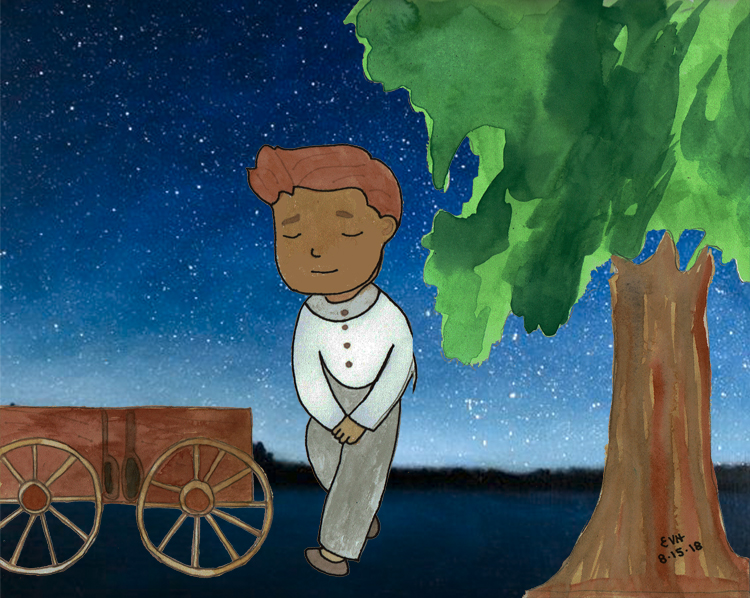
Jataka 414
Jāgara Jātaka
Awake
as told by Eric Van Horn
originally translated by H.T. Francis and R.A. Neil, Cambridge University
originally edited by Professor Edward Byles Cowell, Cambridge University
You will probably catch the double meaning in the lovely verses in this story. “Buddha” means “one who is awake,” so when the spirit discusses the Buddha’s night-long meditation, he is also describing the Buddha as an awakened being. The subject of sleep in Buddhist practice is an interesting one. Prolonged, deep states of meditation reduce greatly and can even eliminate the need for sleep. This can be true even for relatively inexperienced meditators.
“Who is it that awakens.” The Master told this story while he was living at Jetavana. It is about a certain lay brother. He was a disciple who had entered on the First Path (stream-entry). He set out by a forest road from Sāvatthi with a caravan of carts. At a certain pleasant watering spot the leader of the caravan unyoked the 500 carts, and arranging for food—both hard and soft—he took up his lodging there. The men lay down here and there to sleep. Meanwhile the lay brother practiced walking meditation at the root of a tree near the leader of the caravan.
500 robbers who were nearby planned to plunder the caravan. With various weapons in their hands they surrounded it and waited. Seeing the lay brother doing his walking meditation, they stood, waiting to begin plundering until after he should go to sleep. But he went on walking all night. At dawn the robbers threw away the sticks and stones and other weapons they had picked up. They went away, saying, “Master caravan leader, you are the owner of your property because of that man who stayed awake so diligently. You should pay honor to him.”
The caravan’s men, when they woke up, saw the stones and other things thrown away by the robbers. They gave honor to the lay brother, recognizing that they owed their lives to him.

Figure: Protecting the caravan
And so the lay brother traveled to his destination and did his business. Then he returned to Sāvatthi and went to Jetavana. There he saluted and paid homage to the Tathāgata. He sat at his feet, and on his invitation to declare himself, he told the tale. The Master said, “Lay brother, it is not you alone who have gained special merit by waking and watching. Wise men of old did the same.” And so, at the lay brother’s request, he told this story from the past.
Once upon a time when Brahmadatta was reigning in Benares, the Bodhisatta was born into a brahmin family. When he grew up, he learned all the arts at Takkasilā university, and then he returned to live as a householder. After a while he left his house and became a recluse. Soon he attained the Faculty of Meditation (jhāna). He lived in the Himālaya quarter. He lived entirely in the standing and walking postures only. He walked all night without sleeping.
A spirit who lived in a tree at the end of his walk was pleased with him and spoke the first stanza, putting a question to him from a hole in the trunk:
Who is it that wakes when others sleep and sleeps while others wake?
Who is it can read my riddle, who to this will answer make?
The Bodhisatta, hearing the spirit’s voice, spoke this stanza:
I am he who wakes while others sleep, and sleeps while others wake.
I am he can read your riddle, I to you can answer make.
The spirit put a question again in this stanza:
How is it you wake while others sleep, and sleep while others wake?
How is it you read my riddle, how this answer do you make?
He explained the point:
Some men forget that virtue lies in stern sobriety,
When such are sleeping I’m awake, O spirit of the tree.
Passion and vice and ignorance in some have ceased to be,
When such are waking then I sleep, O spirit of the tree.
So it is I wake while others sleep, and sleep while others wake,
So it is I read your riddle, so to you I answer make.
When the Great Being gave this answer, the spirit was pleased and spoke the last stanza in his praise:
Good it is you wake while others sleep, and sleep while others wake
Good your reading of my riddle, good the answer that you make.
And so making the Bodhisatta’s praises, the spirit settled in to his home in the tree.
After the lesson, the Master identified the birth: “At that time, the tree spirit was Uppalavaṇṇā, and I was the recluse.”
(Uppalavaṇṇā was one of the Buddha’s two foremost Bhikkhuni disciples.)
